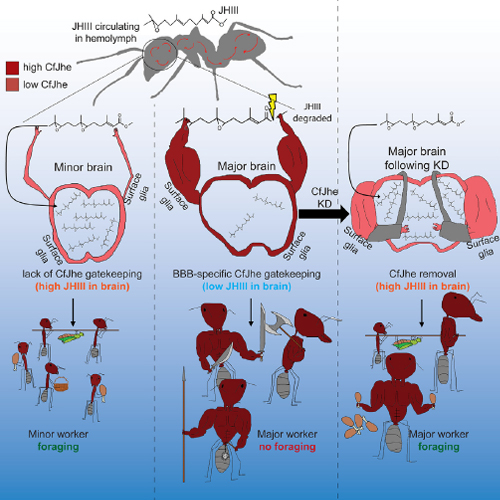Blood
The brain-blood barrier’s role in governing ant behavior
The blood-brain barrier (BBB) has been found to play a significant role in controlling behavior critical to how ant colonies function, according to new research from the Perelman School of Medicine. The implications of this research on the intricate mechanisms behind ant behavior go beyond the world of ants. The findings, published in Cell, hint at similar mechanisms at play in other species, including mammals.
In ants, along with other animals, the BBB consists of tightly locked cells that protect the brain from germs and other harmful substances. The protective barrier plays a key role in how the brain and nervous system operate. The research, led by Shelley Berger, the Daniel S. Och University Professor and director of the Penn Epigenetics Institute, and her lab, focused on carpenter ants and their unique caste-based behaviors. These different castes (social groups) within an ant colony often perform different tasks within the colony, and also often display drastic differences in lifespan.
In these ants, the BBB produces a specialized version of the enzyme juvenile hormone esterase (Jhe), responsible for breaking down the juvenile Hormone (JH3)—which regulates development and reproduction maturation. This Jhe enzyme is typically then deposited in the blood of the insect. However, the researchers found the Jhe enzyme produced by the BBB of carpenter ants is retained within the BBB cells. This localized enzyme controls the amount of JH3 that enters the brain of worker ants.
Different types of worker ants within the same colony have different responsibilities—such as gathering food, building tunnels, or defending the colony. The new findings show that this results, in part, from different levels of the JH3 enzyme expression in their BBB, leading to different levels of the hormone JH3 in the brain. These differences drive the diverse behaviors exhibited by different worker ants within the same colony, including foraging and defense.
“This research reveals a remarkable link between a single enzyme and complex social behaviors in ants,” says Berger. “A single enzyme can trigger a shift between distinct worker behaviors crucial for the colony’s function. The blood-brain barrier’s role in controlling these behaviors is truly remarkable and has implications beyond the ant world.”
This story is by Matt Toal. Read more at Penn Medicine News.

